The Case for Yasin Malik.
May 25, 2022.
Srinagar, indian-occupied Kashmir.
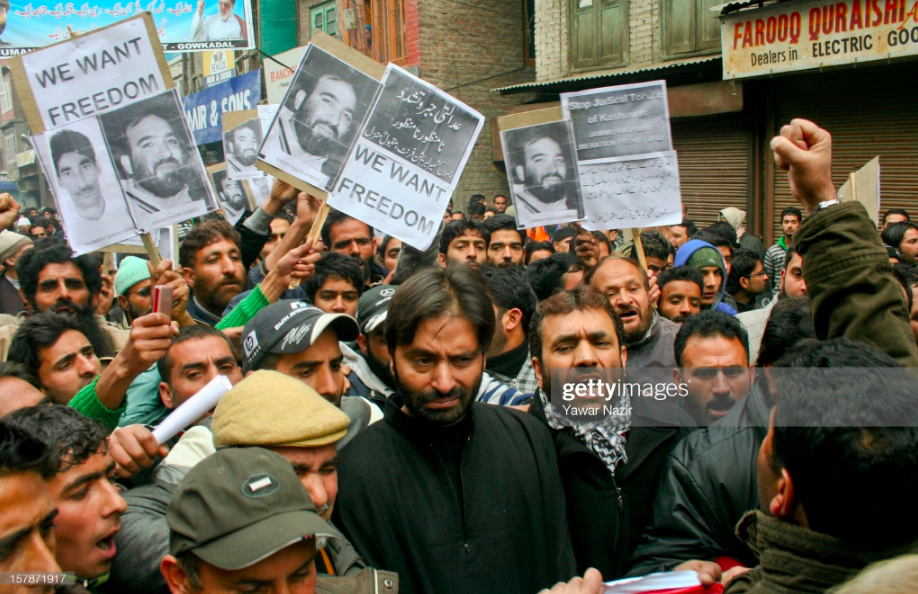
Yasin Malik, one of the most iconic leaders of Kashmir’s freedom struggle
The tragic story of Kashmir is epitomized in the struggles of its beloved son, Yasin Malik, one of the most iconic leaders of Kashmir’s independence struggle. The twists and turns of the political conditions in Kashmir are reflected in the wounds and scars the Indian state has left on Yasin’s body over the past 37 years. Today, India has inflicted the cruelest one so far, sentencing him to a life in prison.
In an Indian prison in New Delhi for more than two years now, battling chronic health problems and fighting the congenitally anti-Kashmiri Indian courts, Yasin is Chairman of the Jammu Kashmir Liberation Front (JKLF) and was one of the three main figures in the Joint Resistance Leadership (JRL), which was formed in response to Modi-led India’s intensification of its war against Kashmiri people.
Yasin was a 15-year-old student in 1986 when Indian forces in Srinagar detained him for distributing “Independent Kashmir” stickers. He was badly tortured and kept in jail for months. This early experience was routine for young people in Kashmir where the Indian state acts as a colonial power and uses brutal violence to terrorize people. However, instead of letting the torture break his spirit, Yasin’s resolve grew. He became a political activist, and along with his friends, canvassed for a local Kashmiri party that was contesting elections in 1987 to find a democratic and peaceful solution to the Kashmir question. As it turned out, Yasin and his friends were too optimistic. India was not interested in a peaceful or democratic solution to the question of Kashmir. Indians rigged the elections and detained the opposition. Yasin was sent from one detention center to another and tortured so badly that his heart was permanently damaged.
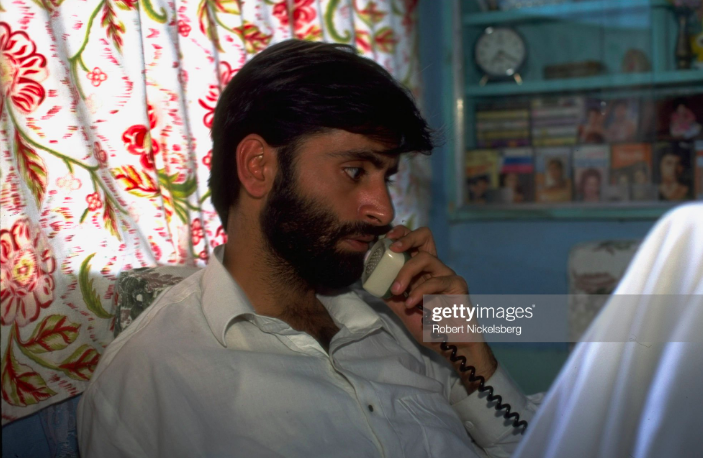
Yasin Malik during his youth.
As India continued to shrink all space for peaceful opposition, it created conditions for an armed resistance. Yasin Malik and his colleagues, inspired by anti-colonial movements elsewhere, were the first ones to start the armed movement in 1989-90. They joined the JKLF, whose creation was inspired by the legendary Kashmiri leader Maqbool Bhat. India had hanged Bhat in 1984 for his advocacy of a revolutionary struggle to free Kashmir. Yasin Malik became the commander of the JKLF with the goal that their struggle would bring international attention to the plight of Kashmiris. Long under the Indian jackboot, Kashmiris saw Yasin and other young activists as inspiring figures, and thousands joined them. Though he was arrested only a few months later, the armed struggle turned into a popular mass movement, dramatically changing the political landscape.
As the Kashmiri freedom struggle took a life of its own, Indian repression became a full-fledged counterinsurgency war. The Indian government, through its emissaries, tried multiple times to get Yasin Malik to call off the movement. He refused to give up his demand for an independent Kashmir and spent the next five years in jail. Eventually in 1994, with the expectation that India would come to the negotiating table as well as ease the exacting terror of India’s counterinsurgency war against Kashmiris, he decided to call a unilateral ceasefire. In his statement, he appealed to Kashmiris to fight Indian state terror with peaceful means, invoking Gandhi and his non-violent strategy. Many Kashmiris saw his ceasefire decision as a cardinal mistake. Indeed, the Indian forces did not respect the ceasefire decision and soon slaughtered hundreds of JKLF cadres.
Despite intense pressure, Malik continued to pursue non-violent means to demand independence for Kashmir. He refused to see Kashmir as a problem between India and Pakistan. Instead, he wanted to make sure Kashmiris are seen as the “primary party” to the Kashmir conflict. Toward this, he and his colleagues traveled all across Kashmir, meeting hundreds of thousands of Kashmiris and making them conscious of their right to self-determination. He also collected a million and a half signatures to show Indian leaders and the international community that Kashmiris wanted a place at the table. However, as India and Pakistan (then under General Musharraf) began negotiations, Kashmiris were again sidelined from these talks. In 2007, Malik started the Safar-e-Azadi (Journey for Freedom) campaign, reaching thousands of Kashmiri towns and villages, receiving love and trust of Kashmiri people everywhere. This mobilization was instrumental in the 2008 Kashmiri protests that demanded the return of land taken over by the Indian state, the opening of the Line of Control that divides the parts of Kashmir under India and Pakistan, and the laying of a roadmap for Kashmir’s freedom.
India crushed these peaceful protests with military violence, killing dozens and injuring thousands. Yasin Malik continued his advocacy of a free Kashmir and was arrested several times. His home neighborhood of Maisuma in Srinagar was turned into a place of regular paramilitary assaults and harassment by Indian forces. Then in 2019, the Indian government fully banned Yasin Malik’s JKLF and other pro-freedom parties in Kashmir. Their offices were raided, and their activists were sent to jails all across India.
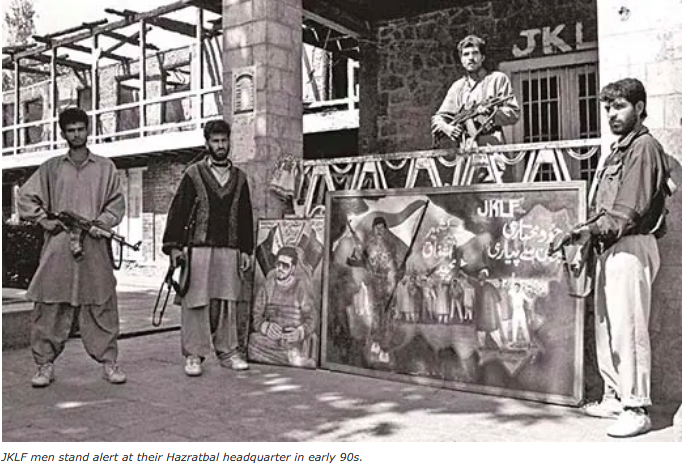
JKLF office in Srinagar, indian-occupied Kashmir. Via Kashmir Life.
“If seeking Azadi (freedom) is a crime, then I am ready to accept this crime and its consequences”, says Malik.
Yasin Malik has now spent about 15 years in Indian jails at various times. This last time he was arrested in February 2019, as part of a wider crackdown preceding India’s unilateral revocation of Kashmir’s semi-autonomous status on August 5, 2019. A 31-year old case was reopened against him.
The case against Yasin has been filed under the draconian Unlawful Activities Prevention Act, which gives the Indian government the arbitrary power to declare anyone a “terrorist,” without the need of any trial or ‘judicial formalities’ (read more here!). According to the FIR, the charges leveled against him are “receiving funds from Pakistan, including from Hafiz Saeed of the Lashkar-e-Taiba and Syed Salahuddin of the Hizb-ul-Mujahideen, to foment trouble in the Valley through stone-pelting, burning down of schools, and organising strikes and protests.”
On 19 May 2022, Indian media reported that Yasin Malik had “confessed to his crimes” in the court. But these reports twisted the Yasin’s full statement, which was reported by the JKLF and AlJazeera: “Terrorism-related charges leveled against me are concocted, fabricated and politically motivated. If seeking Azadi (freedom) is a crime, then I am ready to accept this crime and its consequences.”
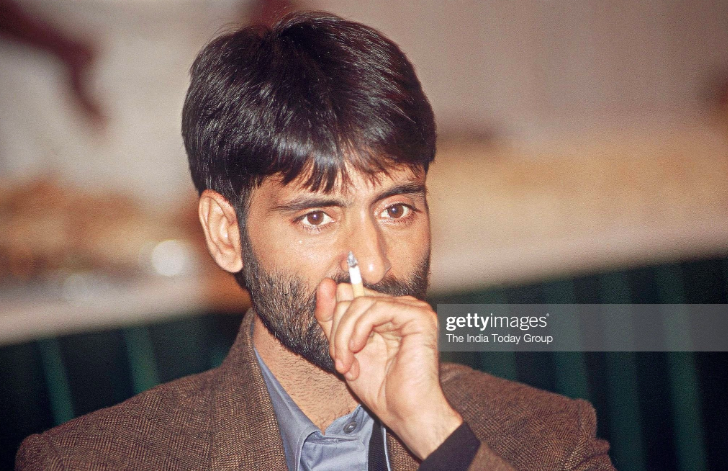
Replicating the Israeli model, the Indian judicial system has a history of committing deliberate miscarriage of justice against Kashmiris. For most of the trial, a court in Jammu heard the case against Yasin without him being present. Yasin Malik’s family released one of his letters from the Tihar jail in Delhi in which he points out that the Indian court had been blatantly prejudicial against him. The Indian judge refused to listen to him and the jail authorities refused to bring him to the court.
As he had done several times before, in April 2021, Yasin Malik decided to go on a hunger strike to demand a fair trial. In his statement, he said: “I have relentlessly worked hard for the freedom of my nation, for a peaceful negotiated settlement of Jammu Kashmir, and for the promotion of non-violence. I will prefer an honorable death instead of a disgraceful life”.
Unable to prove any charges against Yasin Malik, the Indian court has treated his 19 May 2022 statement as a “confession,” when it is clear he is not confessing to the charges of “terrorism.” This only reflects the predatory ways the Indian courts function against Kashmiris.
On the 25th of May 2022, the Indian court passed its sentence of life in prison.
Ahead of this sentencing, India had deployed an additional 15000 of its occupational forces in Kashmir and put many parts of the region under yet another communication blockade, which shows the quantum of sentencing had been pre-decided.
As Hindutva fascism in India consolidates, it is unlikely that the Indian state is willing to treat Kashmiris and their voices and aspirations with dignity. The way India has treated Yasin Malik shows that its intention is to keep the Kashmir cauldron burning to fuel its own hateful politics. His steadfast advocacy of a free Kashmir and the curbs Kashmiri activists face traveling outside the region, as a result, have meant that, for years now, he has been unable to see his wife and little daughter who have been prevented from traveling to Kashmir and living in their own home. Physically weak from years of torture and forcible deprivation, Yasin Malik’s health has been consistently deteriorating. He was denied care even during a COVID-19 outbreak in the prison where he is being held.
The Indian state has historically treated Kashmiri lives as expendable. Yasin’s life is in grave danger. Indian courts have in particular treated Kashmiris who resist the Indian state with the cruelest forms of punishment. Maqbool Bhat was hanged without the due process of law. Afzal Guru was sentenced to death in a trial that was nothing but a sham of justice. The sentencing judge proclaimed that Afzal had to die “to satisfy the collective conscience of India.” This blood-thirsty “conscience” is now attempting to take the life of yet another son of Kashmir. Hindu rightwing forces are being gradually mobilized and they are baying for his blood. Today’s sentence may not be the end of Yasin tribulations. Is Malik set to follow Maqbool Bhat and Afzal Guru to the gallows of a colonial state?
As Kashmiris, we must remain vigilant. It is our duty to inform the world and to put pressure on the Indian government to release Yasin and all other Kashmiri political prisoners. We must not forget those who have given their entire lives to the cause of our freedom.
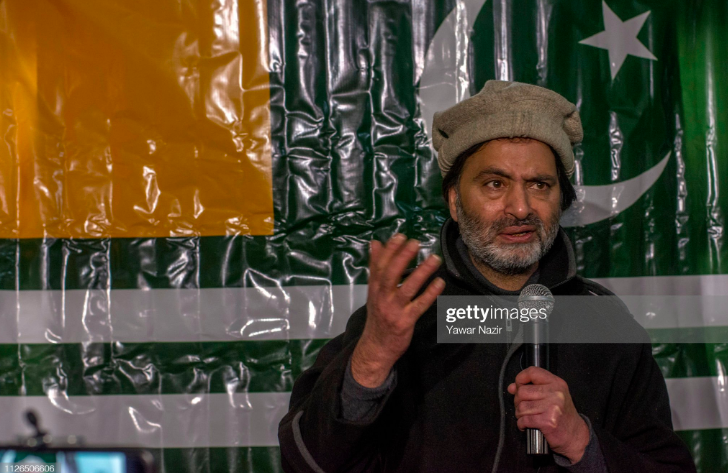
Archived photo of Yasin Malik giving a speech with the Kashmir flag in the background.
Stay in touch with Stand with Kashmir.
Stand With Kashmir (SWK) is a Kashmiri-driven independent, transnational, grassroots movement committed to standing in solidarity with the people of Indian occupied Kashmir in ending the Indian occupation of their homeland and supporting the right to self-determination of the pre-partition state of Jammu and Kashmir. We want to hear from you. If you have general inquiries, suggestions, or concerns, please email us at info@standwithkashmir.org.
©2023 Stand With Kashmir All rights reserved. SWK is a 501(c)(3) non-for-profit organization.
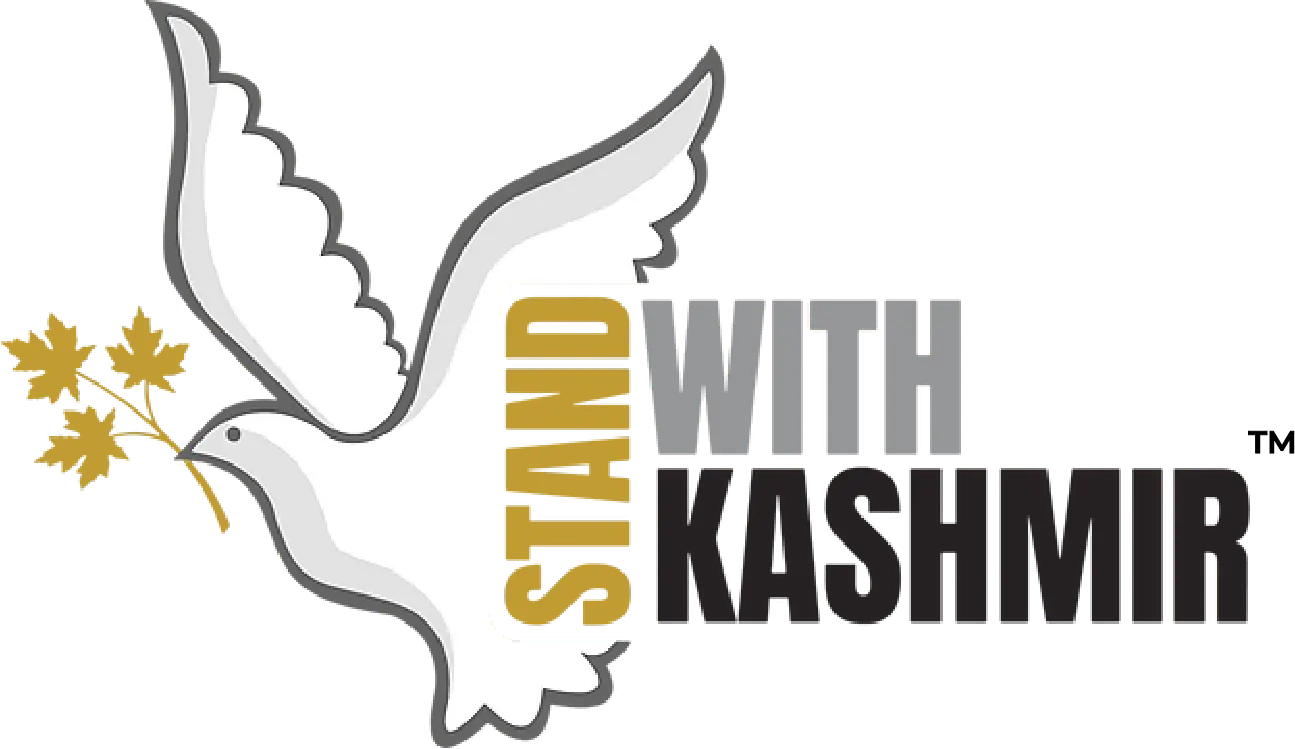
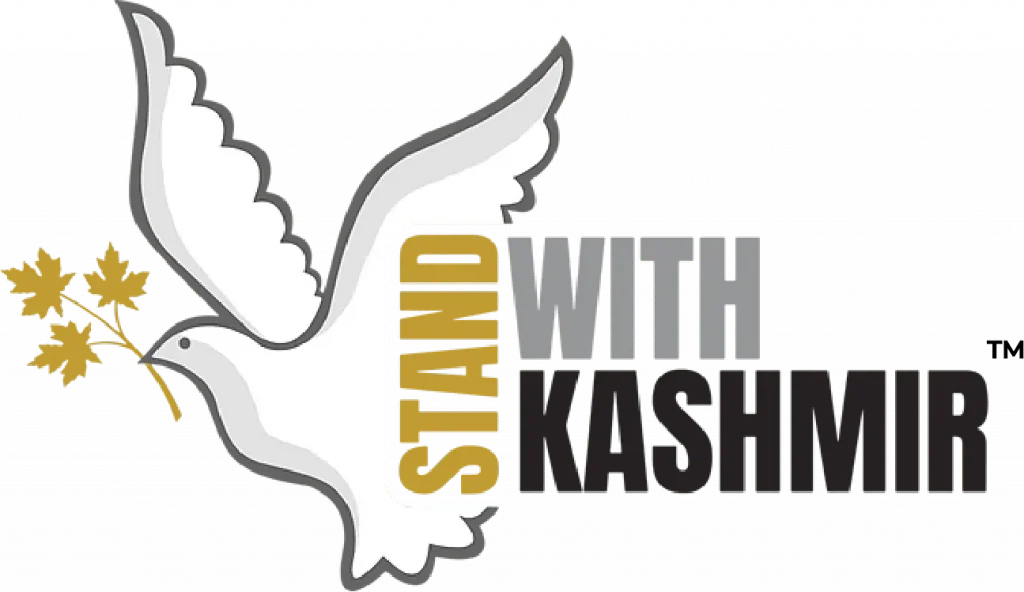
Leave a Reply